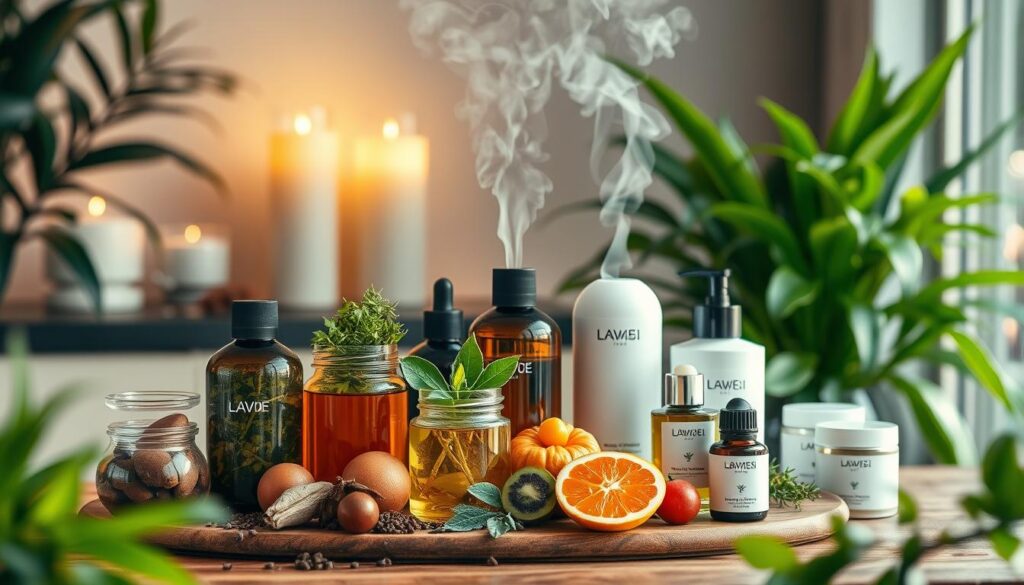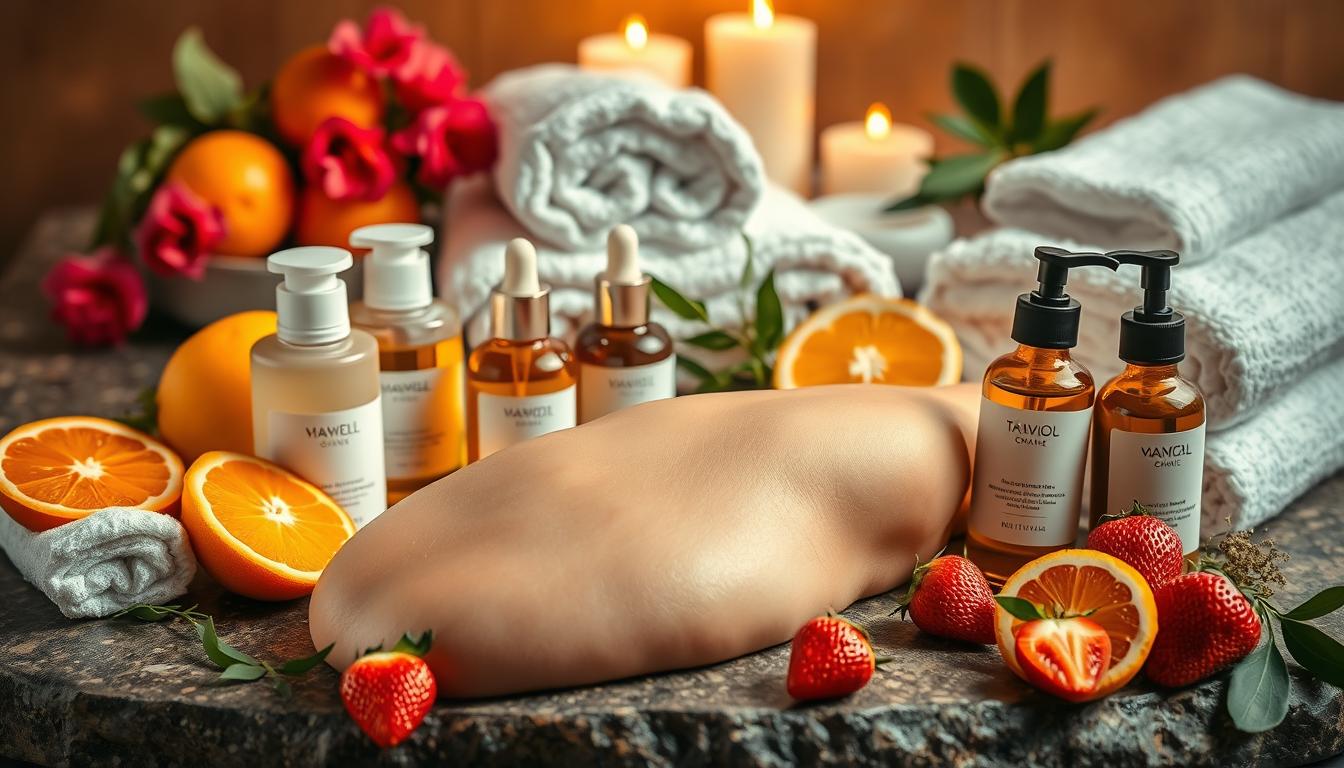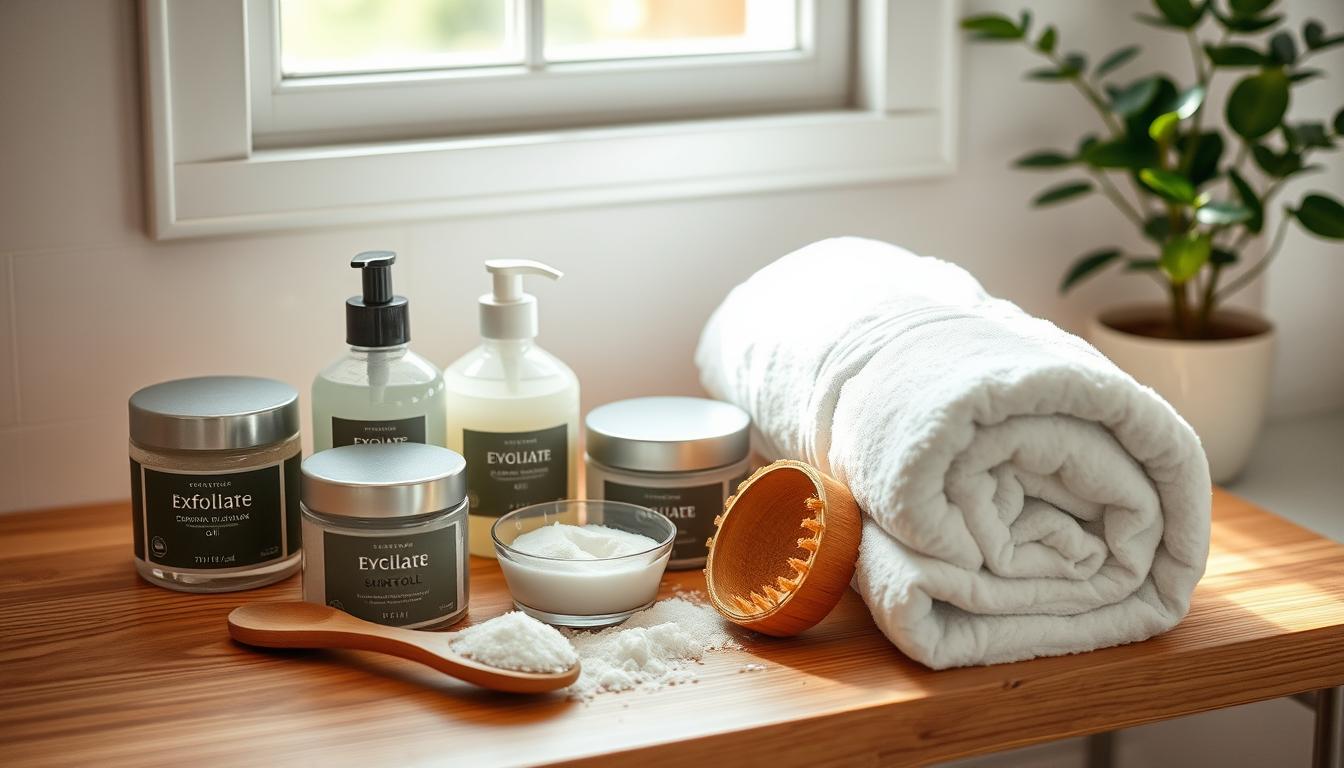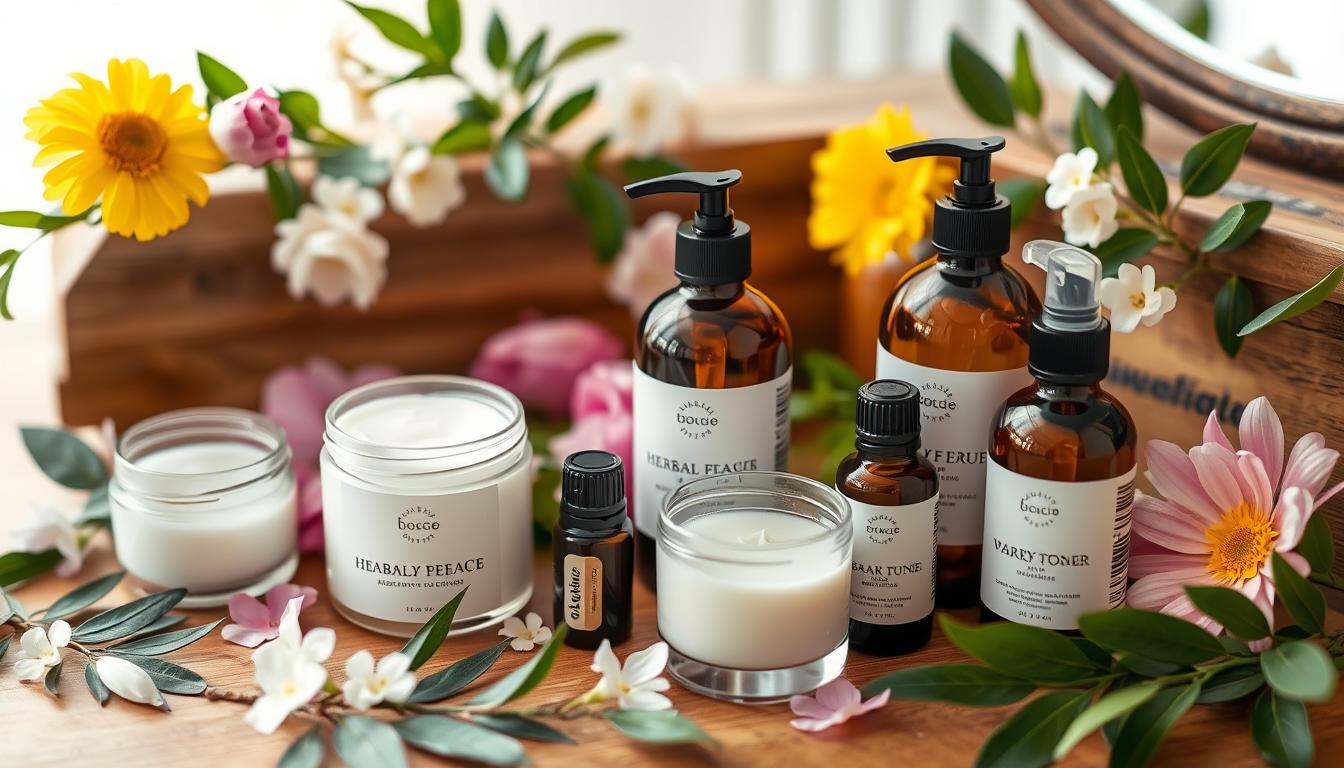Many of us dream of having healthy, glowing skin. In this guide, top dermatologists share their best tips. They cover everything from knowing your skin type to creating a daily skincare routine. You’ll learn how to get and keep your skin looking its best.
Key Takeaways
- Discover the importance of identifying your skin type for personalized skincare
- Learn the essential components of a daily skincare routine, including cleansing, moisturizing, and sun protection
- Explore the role of nutrition, sleep, and stress management in maintaining healthy skin
- Understand the benefits of regular exfoliation and how to choose the right products
- Gain insights on navigating seasonal skin changes and addressing common skin concerns
Understanding Your Skin Type
Starting a healthy, glowing skincare routine means knowing your skin type. It could be oily, dry, combination, or sensitive. Choosing the right moisturizing techniques and products is key for great skin.
Identifying Different Skin Types
Finding out your skin type is easy once you know what to look for. Here’s a quick guide to the most common types:
- Oily Skin: Looks shiny, greasy, with big pores and often gets blemishes.
- Dry Skin: Feels tight, flaky, and dehydrated, with visible lines and a dull look.
- Combination Skin: Has oily areas (forehead, nose, chin) and dry cheeks.
- Sensitive Skin: Gets red, irritated, and reacts to some natural ingredients or things in the environment.
The Importance of Knowing Your Skin Type
Knowing your skin type is key to picking the right skincare products. It helps you create a routine that meets your specific needs. This way, you can get a healthy, balanced, and radiant look.
Understanding your skin type lets you make smart choices about moisturizing techniques and natural ingredients. This ensures your skincare routine is both effective and tailored to you.
Daily Skincare Routine Essentials
Getting healthy, glowing skin starts with a good daily skincare routine. Let’s look at the key steps to improve your skin and keep it looking great.
Cleansing: Keeping Your Skin Fresh
Proper cleansing is the base of a good skincare routine. It removes dirt, extra oil, and dead skin, making your skin feel clean and fresh. Pick a gentle cleanser that fits your skin type. Don’t scrub too hard, as it can dry out or irritate your skin.
Moisturizing: Hydration Matters
Moisturizing is key, no matter your skin type. Choose a moisturizing product that meets your needs. Whether you have oily or dry skin, it keeps your skin balanced and young-looking.
Sunscreen: Your Best Defense
Sun damage, early aging, and skin cancer risks are high without sun protection. Use a broad-spectrum sunscreen with SPF 30 or higher daily. Apply it to all skin that’s exposed, even on cloudy days. Reapply every two hours when outside.
By sticking to these steps – cleansing, moisturizing, and using sunscreen – you’ll have a strong skincare routine. It will nourish and protect your skin, giving you a healthy, glowing look.
Nutrition for Healthy Skin
Getting radiant, healthy skin is more than just using creams and serums. What you eat is key to keeping your skin looking great. Eating foods rich in nutrients helps your skin glow and stay young.
Foods That Promote Radiance
Some foods are packed with vitamins, minerals, and antioxidants that are good for your skin. For example, foods high in vitamin C like oranges, bell peppers, and kiwis help make collagen. This is important for keeping your skin elastic and firm.
Omega-3 fatty acids in foods like salmon, avocados, and nuts help fight inflammation. They also keep your skin soft and moist. Foods full of antioxidants, like berries, leafy greens, and tomatoes, protect your skin from damage caused by the environment.
Staying Hydrated: The Role of Water
Drinking enough water is essential for healthy, glowing skin. Water helps your skin cells grow and stay moist. It prevents dryness and flakiness. Try to drink at least eight glasses of water a day to keep your skin hydrated and strong.
| Nutrient-Rich Foods for Healthy Skin | Benefits |
|---|---|
| Oranges, Bell Peppers, Kiwis | Rich in Vitamin C, boost collagen production |
| Salmon, Avocados, Nuts | Contain Omega-3 fatty acids, reduce inflammation and hydrate skin |
| Berries, Leafy Greens, Tomatoes | Antioxidant-rich, protect skin from environmental stressors |
By choosing to eat nutrient-rich foods and drinking plenty of water, you can nourish your skin. This will help you achieve a healthy, radiant glow.
The Role of Sleep in Skin Health
Quality sleep is key to keeping your skin healthy and looking young. But, in today’s fast world, many of us don’t get enough sleep. This can really hurt how our skin looks and feels.
Sleep Deprivation and Skin Issues
Not getting enough sleep can harm your skin. When you don’t sleep well, your body makes more stress hormone cortisol. This can cause:
- More inflammation and acne
- Wrinkles and fine lines to show up faster
- A dull, uneven skin tone
- Dehydration and sensitivity because your skin’s barrier is weak
Tips for Better Sleep Hygiene
To keep your skin looking young and healthy, focus on getting good sleep. Here are some ways to improve your sleep:
- Go to bed and wake up at the same time every day, even on weekends.
- Have a calming bedtime routine, like a warm bath or meditation.
- Make sure your bedroom is cool, dark, and quiet for better sleep.
- Stay away from blue light from screens for at least an hour before bed.
- Don’t eat caffeine, alcohol, or big meals close to bedtime.
By following these tips for healthy skin and focusing on your skincare routine, you can make sleep work for your skin. It’s a powerful way to fight aging.

Importance of Regular Exfoliation
Exfoliation is key to keeping your skin healthy and bright. It removes dead skin cells and clears pores. This makes your skin look better and helps your skincare products work better.
How Often Should You Exfoliate?
How often you should exfoliate depends on your skin type and how sensitive it is. Here’s a basic guide:
- Oily or acne-prone skin: 2-3 times per week
- Normal to combination skin: 1-2 times per week
- Dry or sensitive skin: 1-2 times per week, using a gentle exfoliant
Pay attention to how your skin reacts. If you exfoliate too much, it might get irritated. Start slow and increase as your skin gets used to it.
The Benefits of Chemical vs. Physical Exfoliants
There are two main types of exfoliants: chemical and physical. Each has its own benefits:
| Chemical Exfoliants | Physical Exfoliants |
|---|---|
|
|
Using both chemical and physical exfoliants in your skincare routine can help you achieve healthy, glowing skin.
“Exfoliation is the key to unlocking your skin’s natural radiance. It’s the unsung hero of a healthy skincare routine.”
The Effects of Stress on Your Skin
Stress can deeply affect your skin’s health and look. When you’re stressed for a long time, it can cause many skin problems. Knowing how stress affects your skin is key to keeping your skin looking young and healthy.
Stress-Induced Skin Conditions
Stress can make many skin issues worse, like acne prevention, anti-aging remedies, and tips for healthy skin. Some common skin problems caused by stress are:
- Acne breakouts: Stress makes your body produce more sebum, clogging pores and causing acne.
- Eczema flare-ups: Stress can make eczema symptoms worse, making your skin red, itchy, and inflamed.
- Psoriasis exacerbation: Stress can make your immune system react, causing scaly, red patches on your skin.
- Premature aging: Chronic stress can make your skin age faster, leading to fine lines, wrinkles, and loss of elasticity.
Stress Management Techniques
There are many ways to manage stress and protect your skin. Some good methods are:
- Try relaxation techniques like meditation, deep breathing, or yoga.
- Do regular exercise to reduce stress and improve your skin.
- Make sure to get enough sleep, as lack of sleep can worsen skin problems.
- Use stress-reducing supplements like adaptogenic herbs or omega-3 fatty acids.
- Seek help from professionals like counselors or therapists to deal with stress.
By managing stress and taking care of your skin, you can keep your skin healthy and glowing. This also helps you feel better overall.
| Stress-Induced Skin Condition | Symptoms | Stress Management Techniques |
|---|---|---|
| Acne | Increased sebum production, clogged pores, and inflammatory breakouts | Relaxation practices, exercise, and adjusting skincare routine |
| Eczema | Redness, itching, and inflammation of the skin | Stress reduction, moisturizing, and avoiding irritants |
| Psoriasis | Scaly, red patches on the skin | Relaxation techniques, medication, and lifestyle changes |
| Premature Aging | Fine lines, wrinkles, and loss of skin elasticity | Adequate sleep, a healthy diet, and topical anti-aging products |

“Stress doesn’t just affect our mental well-being; it can also have a profound impact on the health and appearance of our skin. By addressing stress and implementing effective management techniques, we can maintain a youthful, radiant complexion.”
Choosing the Right Skincare Products
Getting healthy, radiant skin starts with the right skincare products. With so many choices, it’s easy to get lost. Knowing what to look for and what to avoid helps you pick the best for your skin.
Ingredients to Look For
Look for skincare with natural ingredients that are good for your skin. Some top picks include:
- Hyaluronic acid: It deeply hydrates and plumps your skin.
- Vitamin C: It brightens and improves your skin’s complexion.
- Retinol: It helps your skin look smoother by reducing fine lines and wrinkles.
- Aloe vera: It soothes and calms sensitive skin.
- Ceramides: They help keep your skin’s barrier strong and hold in moisture.
Ingredients to Avoid
Some ingredients can harm your skin and mess up your skincare routine. Stay away from these:
- Parabens: They’re used to preserve products but might be bad for your health.
- Sulfates: They can take away your skin’s natural oils, causing dryness and irritation.
- Phthalates: Found in fragrances, they might mess with your hormones.
- Alcohol: It can dry out and irritate your skin, especially if it’s sensitive.
Learning about these ingredients helps you choose better for your skincare routine. This way, you can keep your skin well-nourished and moisturized.
Sun Protection Tips
Keeping your skin safe from the sun’s harmful rays is key to healthy, young-looking skin. Knowing about sun protection factors (SPF) and following the best sun exposure practices is crucial. This helps you stay safe and look radiant.
Understanding SPF Ratings
The sun protection factor (SPF) shows how well a sunscreen guards against UVB rays. These rays cause sunburns. A higher SPF means more protection. Always choose a sunscreen with SPF 30 or higher for the best protection.
Best Practices for Sun Exposure
- Apply sunscreen generously and reapply every 2 hours, or more frequently if swimming or sweating.
- Seek shade during the peak sun hours, typically between 10 AM and 4 PM.
- Wear protective clothing, such as wide-brimmed hats, long-sleeved shirts, and sunglasses.
- Avoid tanning beds and sun lamps, as they can increase your risk of skin cancer.
| SPF Rating | Sun Protection |
|---|---|
| SPF 30 | Blocks 97% of UVB rays |
| SPF 50 | Blocks 98% of UVB rays |
| SPF 100 | Blocks 99% of UVB rays |
Remember, sun protection is vital for preventing sunburns, early skin aging, and skin cancer. By following these tips, you can enjoy the outdoors while keeping your skin healthy and glowing.

Maintaining Skin During Seasonal Changes
Your skincare routine should change with the seasons. This keeps your skin healthy and vibrant all year. Here are key tips for your skincare routine, moisturizing techniques, and skin hydration in winter and summer.
Winter Skincare Strategies
Winter brings dry, cold air that takes away your skin’s moisture. This makes your skin tight, flaky, and irritated. To fight these issues, use intense moisturizing techniques and protect your skin’s barrier:
- Switch to a thicker, creamier moisturizer to lock in moisture.
- Add a hyaluronic acid serum to bring moisture deep into your skin.
- Apply a nourishing facial oil before moisturizer for extra skin hydration.
- Use a gentle, non-foaming cleanser to keep your skin’s oils.
- Exfoliate less often to avoid drying out your skin.
Summer Skin Care Essentials
When it gets hot and sunny, your skincare routine must change. Use light, oil-free products that won’t clog pores and protect from the sun:
- Go for a gel or oil-free moisturizer to hydrate without feeling heavy.
- Use a mattifying primer or blotting papers to control shine.
- Apply a lot of SPF 30 or higher sunscreen every day, even on cloudy days.
- Exfoliate often to remove dead skin cells and prevent clogged pores.
- Choose a hydrating facial mist to refresh and energize your skin all day.
By adjusting your skincare routine, moisturizing techniques, and skin hydration for each season, your skin stays healthy, radiant, and strong all year.
The Impact of Smoking and Alcohol
Our daily choices greatly affect our skin’s health and look. Smoking and drinking too much alcohol are two big no-nos. They can make your skin age faster and cause many skin problems.
How Lifestyle Choices Affect Your Skin
Smoking is bad for your skin. It damages collagen and elastin, causing wrinkles and a dull look. It also cuts off blood flow, making your skin look unhealthy.
Drinking too much alcohol is also bad. It makes your skin dry and can make fine lines worse. It can also make skin conditions like rosacea and eczema worse, leading to redness and irritation.
Tips for Reducing Harmful Habits
- If you smoke, try to quit or cut down. Get help from your doctor or use nicotine replacement therapy.
- Drink alcohol in moderation. Women should have no more than one drink a day, and men no more than two.
- Drink lots of water to fight off dryness from smoking and drinking.
- Use anti-aging remedies and tips for healthy skin every day. This includes using moisturizer with SPF and exfoliating to prevent acne prevention.
By choosing better habits and quitting bad ones, you can keep your skin healthy and young-looking.

Seeking Professional Help
Many people focus on keeping their skin healthy and glowing. But sometimes, doing it yourself isn’t enough. For more serious skin problems, a dermatologist’s help is crucial. Let’s look at when you might need to see a skin specialist and what they can help with.
When to See a Dermatologist
It’s a good idea to get your skin checked by a dermatologist regularly. Even if you don’t have any skin worries right now. They can spot problems early and give you advice to keep your acne prevention, anti-aging remedies, and tips for healthy skin on track. You should see a dermatologist if you have:
- Persistent or severe acne that doesn’t get better with store-bought treatments
- Unexplained rashes, growths, or changes in your skin’s look
- Worries about skin cancer or other skin health issues
- Want professional anti-aging treatments or procedures
Common Skin Conditions to Address
Dermatologists can handle many skin problems, from common ones like acne and eczema to more serious ones like psoriasis, rosacea, and skin cancer. They create treatment plans just for you, prescribe medicines, and suggest the best tips for healthy skin for your needs.
Don’t wait to get help for your skin’s health. Regular check-ups and early problem-solving can keep your skin looking young and healthy for a long time.
Understanding Skin Aging
As you age, your skin changes naturally. You might see fine lines, wrinkles, age spots, and less elasticity. These changes come from genetics, sun exposure, and lifestyle choices. Knowing these signs is key to a good anti-aging skincare plan.
Signs of Aging Skin
Wrinkles, especially around the eyes, forehead, and mouth, are common signs. You might also notice less firmness and less glow. Age spots, or sun spots, come from years of sun damage. Sagging skin and less elasticity are also signs of aging.
Anti-Aging Tips for Every Age
Keeping your skin young and healthy is important at every age. In your 20s, start a moisturizing routine and protect your skin from UV rays. In your 30s and 40s, use anti-aging serums and retinol products to fight early aging signs.
In your 50s and beyond, keep hydrating and think about collagen-boosting supplements. Eating well and living healthily can make your skin look young and radiant, no matter your age.



